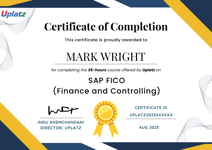
Software Engineering Manager Career Path
Self-paced videos, Lifetime access, Study material, Certification prep, Technical support, Course Completion Certificate
Uplatz
Summary
- Uplatz Certificate of Completion - Free
Add to basket or enquire
Overview
Uplatz provides this powerful and extensive Career Path program to help you become an Software Engineering Manager. It is a program covering all topics related to Technology & Software Engineering Management in the form of self-paced video tutorials. You will be awarded Course Completion Certificate at the end of the course.
The Software Engineering Manager career path includes the following self-paced video courses:
- Introduction to DevOps
- Git and GitHub
- Python Programming
- Python Programming (basic to advanced)
- Java Programming
- JavaScript Programming
- R Programming (basic to advanced)
- API Design & Development
- Software Testing (Manual & Automation)
- Software Performance Engineering and Multicore Programming
- Performance Testing with LoadRunner
- Cloud Computing Basics
- Machine Learning (basic to advanced)
- Business Intelligence for Beginners
- Power BI
- Leadership and Management
- Project Management Fundamentals
- Microsoft Project
A Software Engineering Manager is a leadership role responsible for overseeing a team of software engineers and managing the technical aspects of software development projects. This role requires a combination of strong technical knowledge, leadership skills, and the ability to guide teams to deliver high-quality software products. Here are the key responsibilities and attributes associated with a Software Engineering Manager:
Responsibilities of a Software Engineering Manager
Team Leadership: Lead and manage a team of software engineers. Provide direction, mentorship, and support to help team members achieve their goals and excel in their roles.
Project Management: Oversee software development projects from inception to delivery. Define project goals, scope, and timelines. Allocate resources, track progress, and ensure successful project completion.
Technical Guidance: Offer technical expertise and guidance to the team. Assist in architectural decisions, design reviews, and complex problem-solving.
Code Review and Quality Assurance: Review code submissions to ensure quality, adherence to coding standards, and best practices. Provide constructive feedback to improve code quality.
Collaboration: Work closely with product managers, designers, and stakeholders to gather requirements, prioritize tasks, and ensure alignment between technical solutions and business objectives.
Resource Management: Manage team resources efficiently. Assign tasks based on team members' strengths, skills, and interests.
Performance Management: Set performance expectations, conduct regular performance evaluations, and provide feedback to help team members grow and develop.
Communication: Communicate technical concepts and project updates clearly to both technical and non-technical stakeholders. Foster open communication within the team.
Attributes of a Software Engineering Manager
Technical Expertise: Possess a deep understanding of software development methodologies, programming languages, and software architecture. Stay current with emerging technologies and trends.
Leadership Skills: Demonstrate strong leadership qualities, including the ability to inspire, motivate, and guide team members toward shared goals.
Problem-Solving: Exhibit excellent problem-solving skills and the ability to navigate technical challenges. Encourage the team to think critically and find innovative solutions.
Communication: Communicate effectively with team members, stakeholders, and upper management. Translate complex technical concepts into understandable language.
Team Building: Foster a collaborative and inclusive team environment. Build a diverse and high-performing engineering team.
Decision-Making: Make informed decisions that balance technical considerations with business needs. Delegate responsibilities effectively.
Strategic Thinking: Understand the long-term technical and business strategies of the organization. Contribute to the development of technical roadmaps.
Adaptability: Thrive in dynamic environments and adapt to changing project requirements, technologies, and priorities.
A Software Engineering Manager plays a crucial role in ensuring the successful delivery of software projects, maintaining technical excellence, and fostering a positive and productive team culture. This role requires a balance of technical proficiency and leadership skills to guide teams and projects to success.
Course media
Description
A Software Engineering Manager needs a combination of technical skills, leadership abilities, and interpersonal skills to effectively manage a team of software engineers and deliver successful projects. Here's a breakdown of the key technologies and skills required:
Technical Skills:
Software Development: A strong foundation in software development concepts, including proficiency in relevant programming languages, frameworks, and tools used by the team.
Architecture and Design: Understanding of software architecture patterns, design principles, and the ability to guide architectural decisions.
Version Control: Proficiency in using version control systems (e.g., Git) to manage source code and collaborate with the team.
Agile Methodologies: Familiarity with Agile practices and methodologies (Scrum, Kanban, etc.) to facilitate effective project management and collaboration.
DevOps Practices: Knowledge of DevOps practices and tools for continuous integration, continuous delivery, and automated testing.
Cloud Technologies: Awareness of cloud computing platforms (e.g., AWS, Azure, Google Cloud) and their services to leverage cloud resources for software development and deployment.
Database Management: Understanding of database technologies, both relational and NoSQL, and how to design and manage databases effectively.
Security Practices: Knowledge of software security best practices, including code security, data protection, and compliance with industry standards.
Leadership and Soft Skills:
Team Leadership: Strong leadership qualities, including the ability to motivate, inspire, and lead a team of engineers.
Communication: Excellent communication skills to effectively convey technical concepts to both technical and non-technical stakeholders.
Conflict Resolution: Ability to handle conflicts and challenges within the team and facilitate healthy communication and collaboration.
Decision-Making: Strong decision-making abilities, considering both technical and business aspects.
Project Management: Proficiency in project management methodologies, including planning, resource allocation, tracking progress, and risk management.
Coaching and Mentorship: Capability to mentor and guide team members in their career growth and technical development.
Adaptability: Flexibility to adapt to changing priorities, technologies, and project requirements.
Empathy: Understanding and considering the needs, concerns, and perspectives of team members and stakeholders.
Strategic Thinking: Ability to align technical efforts with broader business goals and contribute to long-term technical strategies.
Negotiation: Skill in negotiating with stakeholders, managing expectations, and finding solutions that balance various interests.
Innovation: Encouraging creative thinking and fostering an environment where new ideas are welcomed and explored.
The specific technologies and skills required can vary based on the nature of the projects, industry, and the size and complexity of the engineering team. An effective Software Engineering Manager combines technical expertise with strong leadership qualities to guide their team to success.
Who is this course for?
Everyone
Requirements
Passion and enthusiasm to succeed!
Career path
- Software Engineering Manager
- Engineering Manager
- Engineering Lead
- Software Development Manager
- Technology Manager
- Technical Team Lead
- Engineering Director
- Application Development Manager
- Product Engineering Manager
- Software Team Lead
- Software Project Manager
- R&D Manager
- Technology Consultant
- IT Consultant
- Team Lead (Engineering)
- Lead Developer
- Lead Architect
- Chief Technology Officer (CTO)
Questions and answers
Currently there are no Q&As for this course. Be the first to ask a question.
Certificates
Uplatz Certificate of Completion
Digital certificate - Included
Course Completion Certificate by Uplatz
Reviews
Currently there are no reviews for this course. Be the first to leave a review.
Legal information
This course is advertised on reed.co.uk by the Course Provider, whose terms and conditions apply. Purchases are made directly from the Course Provider, and as such, content and materials are supplied by the Course Provider directly. Reed is acting as agent and not reseller in relation to this course. Reed's only responsibility is to facilitate your payment for the course. It is your responsibility to review and agree to the Course Provider's terms and conditions and satisfy yourself as to the suitability of the course you intend to purchase. Reed will not have any responsibility for the content of the course and/or associated materials.



